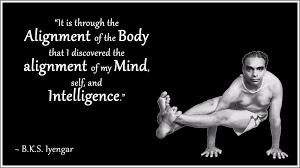Correction is NOT Criticism

“Life begins at the end of your comfort zone.” Neale Donald Walsch
Yes, this is a quote from a refrigerator magnet, but for me it speaks volumes about what we are doing through yoga.
Recently I have had a couple conversations that concern me about the idea of “correction” given in Yoga class. Iyengar Yoga is know for its engaged and engaging teachers. “Observation and Correction” is a unique and huge element of our training – the ability to really “see” the students in front of us and know how to best give a tool, advice, or adjustment so that they might improve and progress over time within the practice.
This, in my opinion, is the role of a yoga teacher – to see something that my own mind or body misses in its blind spots or habits, and the ability then to give guidance toward other avenues or paths to experience those things that I might not even have thought existed!!
Really, the first practice of yoga is this – admitting that we spend most of our normal lives within the individual boundaries, habits, and thoughts of our own “comfort zones”. We like to “stay in our own lane”. We create stories for ourselves surrounding most of the activities we choose to partake in (or not) and attach to those narratives as our identities. For most of us, having anything within those identities challenged is like a death. We have to acknowledge the roles of Kleshas in our life and practice, and realize this can give us a key toward the real transformative power of yoga.
What are the Kleshas you ask? They are the obstacles to practicing or experiencing yoga, or union with our true SELF.
- AVIDYA : we have forgotten that we are spiritual beings having a human experience, caught up in all the turmoil and disturbance of the “humanness” of life. Thinking that all of THAT STUFF is what we are, instead of BEING who we actually are is our “ignorance”.
- ASMITA : the unhelpful ego – the part of you that says you are better or worse than, overly qualified or not qualified at all, the “can’t” and the “supposed to” voices in our heads.
- RAGA : attaching to that which is pleasurable
- DVESA : avoiding that which is uncomfortable or undesirable
- ABHINIVESA : love of life, fear of death (which thankfully the Yoga Sutras acknowledge is the hardest one to overcome)
These Kleshas are the reason for yoga to come into being. If we as humans were getting along perfectly “as we are”, then a practice of transforming the self and our being on the planet would not need to exist.
The role of the mind in yoga is integral to the practice, and understanding our own mind comes first and foremost. For me this is where we choose to see corrections we might get in a yoga class as “helpful” or “judgmental”, as “criticism” or “guidance in another direction”. Let me just say, first and foremost, and without a doubt, that every Iyengar Yoga teacher I have had in front of me has been there to help…it is what we are taught to do. Are we all tactful all the time? Maybe not. Is the language we use important? Absolutely, and we have to individually continue to try to do better. Are we judging you on your practice. No. Our purpose again is to see something you may not be seeing and figure out how we might get you to see it for yourself.
Left to our own human devices, as the kleshas suggest, and I know I am of course guilty of, we practice the things we “like” to practice or that make us feel “good”. We avoid the things that are “difficult”, “scary”, “uncomfortable”, or “hard”. Our yoga teachers are there to challenge that raga and dvesa and even a little of the abhinivesa in all of us.
When the teacher challenges those above kleshas more of body and mind, we are suddenly faced with the challenge of our emotional and spiritual kleashas of asmita and avidya as well. Ohhhh…I sure do get angry sometimes when I am asked to do poses I don’t like in class…sometimes I absolutely blame the teacher for being that hard or pushy. But, if I continue forth with that pose or thing, I more often than not learn something new, and in many cases I have learned over time to find ways and means to love that experience. But that takes practice and showing up again and again, even if I know it might be difficult.
Avidya I think is challenged most when we “think we have done” and then we are told to do something “more” or “differently”. We “think we know who we are” as well, but again, the mere presence of yoga in the life of the human being is proof enough that we have missed something.
This is not to say you block out your own voice or give over your power, but the teacher standing before you has a different experience, a different “take”, a different perspective, and it might be interesting to see yourself from their view. Open your mind to a new perspective, a different way of doing, a change of lanes and scenery.
In the end, all the correction and guidance given through yoga has the means toward the final “goal” – the obliteration of the kleshas to bring full knowledge of your SELF – from inside and out, on every level, from the comfortable to the uncomfortable, from the dark to the light. THAT is the fullness of the human experience, and THAT is YOGA.